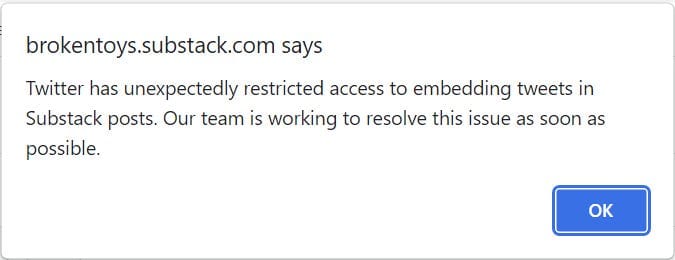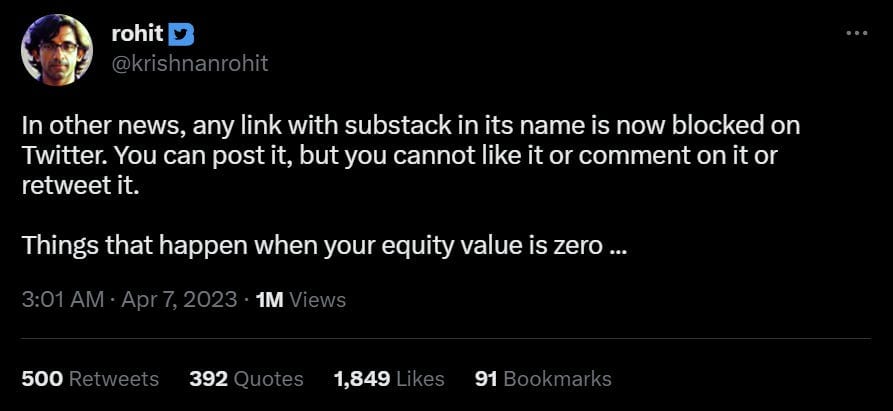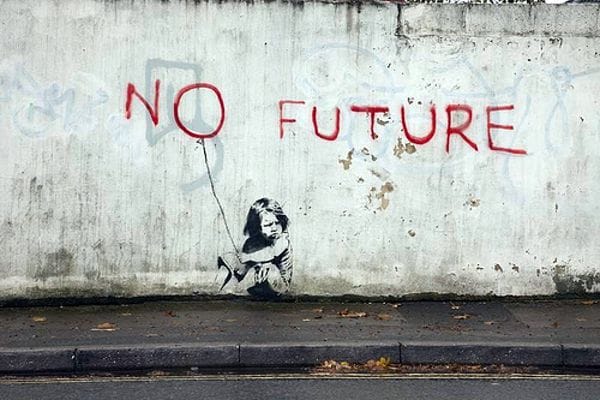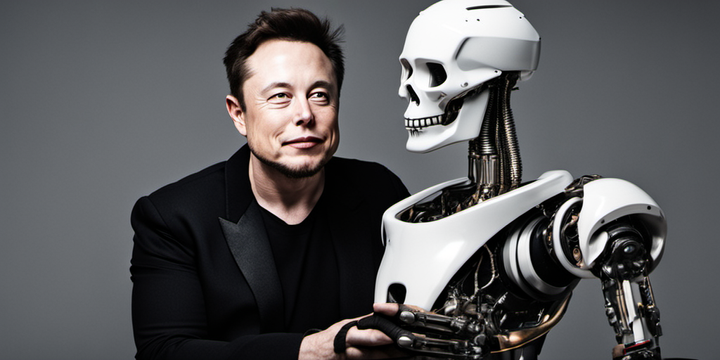Tony Stark vs. the World
The richest man on the planet, proving daily you can't buy everything.

Part of the reason for this newsletter update is an experiment. You see, Elon Musk reportedly has blocked Substack links on Twitter, despite (or possibly because) Substack being precisely the ideological and business model Musk envisions for Twitter itself. It certainly has blocked Twitter embeds on Substack, as can be seen when I just tried to create one:

That’s OK, here at brokentoys.substack.com we fight the power like the Public Enemy wannabes we are (that would be me and my cat) and can easily harness the awe-inspiring power of screenshots.

Substack pays its writers generously (something I’ve studiously avoided, both because I already have a well-paying full time job and because the subscriber base for this newsletter is in the low triple digits) and generally skews rightward in the writers who have found success on the platform (for example, Matt Taibbi and Bari Weiss, two of the reporters Musk hired to investigate Twitter, have turned their own newsletters into independent self-sustaining publications). These are both directions Musk has explicitly claimed as goals for Twitter.
Given that level of similarity, and the fact Substack is not a social network but a blogging platform, it seems quite odd that Musk would order a blanket censoring of Substack, unless you’ve been paying attention the past few months. It seems that Musk’s tenure at Twitter has been mainly to shitpost his way to greatness while avoiding anything involving making Twitter a viable business, or even particularly behaving as a responsible adult. A brief and woefully incomplete synopsis of Musk’s actions as Lord of the Twits thus far:
- Indicated his desire to force users to subscribe to the platform, first at a $20/month rate, then lowered to $8/month when Stephen King complained.
- Dismantled the verified user program (a scheme where people who were considered notable could have a blue check by their name) because of a perception among the right wing that “blue check Twitter”, specifically mainstream media figures, were elitist and dismissive of their extremely valid opinions on Democrats, transgender women, vaccines, and Jews. After months of waffling, Musk finally removed the verification mark from one account (the New York Times) and otherwise made indistinguishable persons verified under the old regime and people who paid for a Twitter subscription. This made browser plugins to denote the difference anyway very popular (an example can be seen in the tweet screenshot above) enabled by a for now still functional Twitter client API.
- Speaking of APIs, Musk has threatened to charge wildly varying amounts somewhat untethered to reality for API usage which in practice would eliminate API usage entirely due to its unaffordability. As I write this (the beginning of the three day Easter weekend of April 7th=9th) these changes appear to be going into effect, with the usual haphazard chaos.
- Unbanned virtually every right-wing account that was banned for such things as inciting riots, racism and abuse, including but not limited to Donald Trump, Jordan Peterson, the Babylon Bee (a rather unfunny Onion clone whose banning for transgender-related slurs prompted Musk to acquire the platform in the first place), and Kanye West. Musk then banned West again immediately when it was clear the musician was unable to make a single tweet of over 5 words without blaming all Jews for his various misfortunes.
- Banned a Twitter account that used publicly available information to track the position of Musk’s private jet (claiming somewhat oddly that it was a tool for assassins) and then banned literally every reporter who posted about the ban, and every reporter who posted about its move to Mastodon (an open source alternative to Twitter). When the banned reporters found out they could still use Twitter’s “Spaces” teleconferencing system to talk to one another, Musk then temporarily shut down Spaces entirely.
- Revamped Twitter’s recommendation algorithm to heavily favor his own posts - at one point the “For You” recommended feed (a now virtually useless algorithmically driven post registry) was almost exclusively Musk’s own tweets. Musk later announced that only subscribers would appear in the “For You” feed.
- Announced a ban on any user posting links to other social networks such as the aforementioned Mastodon, LinkedIn, link.tree, Facebook, or pretty much anywhere else people congregate online, and then reversed himself six hours later.
- After a series of polls on such subjects as whether or not to unban Donald Trump, Musk then posted a poll that he claimed he would abide by on whether or not he should resign as Twitter’s CEO. When the poll results were overwhelmingly in favor of his resignation, Musk then claimed no one else would take the job, then announced that polls would be restricted to subscribers only.
- Labelled NPR, the US publicly funded radio news network, as “state-affiliated media”, a label usually applied to outlets such as Russia Today and Xinhua, to much celebration from right wing users happy to see a liberal-leaning news outlet “GET REKT”. When users pointed out that Twitter’s own posted guidelines specifically exempted publicly funded but not government-run news sources such as the NPR and the BBC from that label, the guidelines were then changed to remove the NPR reference.
- Replaced Twitter’s logo with a doge icon. No one knows why and it was removed shortly thereafter.
Something you might note as missing from all of this is any action that would be considered Musk’s actual job, being the chief executive of Twitter as opposed to the head of its moderation and rules enforcement team. To date, his only visible actions in that role appear to be destroying the value of the platform through firing anyone who disagrees with his tenure, had a connection to the previous ownership, or, finally, anyone not directly seen by Musk as an “extremely hard-core” worker. In all, 75% of Twitter’s staff has been fired, laid off, or quit since Musk’s acquisition of the platform. Even if one believes that Twitter had overstaffed or had departments considered unnecessary (such as public relations, user moderation, customer support, or accounts payable, all of which apparently no longer exist) that is less a trimming of fat then a decimation. The fact Twitter still functions at all is a testament both to the quality of work of those programmers who were fired and those who somehow still remain.
Given that, a reasonable question would be, just what the fuck is Elon Musk doing, anyway? Why is the richest man on the planet, who owns one of the most successful car companies and the most successful private space launch company in the world, concerning himself with forum moderation?
Apparently, it’s just what he likes to do.
He posts - a LOT - on Twitter, and very badly wants those posts to be liked. He posted metrics on every tweet just so he could see how much people liked his posts. And quite a few people do, since Elon Musk was until very recently regarded as a real life Tony Stark, a tycoon with visions of Mars colonies, cryptocurrency reforms, clean energy, and all sorts of other very cool things. Which he has apparently cast aside in a desperate desire to get a certain sector of right wing twitter to like him.
The tragedy is that in the process of Musk’s very public visionquest to gain the approval of @CatTurd2, he has demolished the public commons of the 21st century. Twitter for all its faults, its enabling of Two Minutes Hate versus whoever dared to be “Twitter’s main character” that day, and its undeniable toxicity, still was a place where people could quickly and easily form connections, make friends, and keep up with their social circles. And unlike Facebook, which rapidly devolved into an algorithmically driven farce of ads and posts presented to provoke violent reactions, Twitter through its basic simplicity could still be curated by its users to be what it was designed for - a public or private water cooler.
The emotional loss provoked by Musk’s mismanagement has been already written about, far more eloquently, by Ed Zitron, so I will just refer you to his piece if you haven’t read it already (you should). I will just something add that an astute reader may have noticed about this piece - every time that I referenced an action taken by Twitter, I referred to it as action taken by Elon Musk.
Because that’s what it has been. It no longer is Twitter, it is Elon Musk. He makes the decisions, is the personal face of those decisions, and is the one who attempts to justify them. He has personalized every management decision and made it about him. Because everything continues to be horrible, we are no longer posting on Twitter, we are posting on Elon Musk’s website.
And maybe we should stop.


